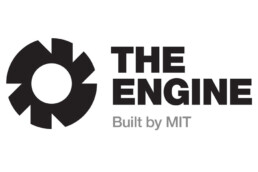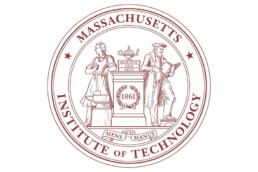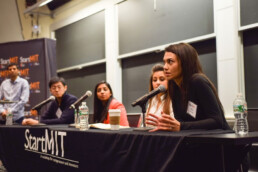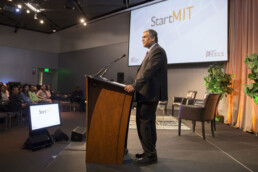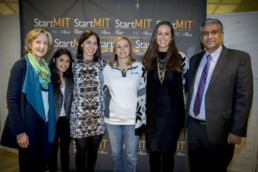Community forum gives insight into how The Engine will run
MIT leadership answers questions about the mission and features of the new accelerator.
At a community forum on MIT’s new startup accelerator, The Engine, administrators discussed the new enterprise and fielded questions about its formation, components, mission, funding, mentor and equipment access, startup-selection process, and other issues.
The forum, held last night in Building 32, opened with remarks from MIT’s leadership who helped launch The Engine: MIT President L. Rafael Reif, professor and head of the Department of Electrical Engineering and Computer Science Anantha Chandrakasan, Provost Martin Schmidt, and Executive Vice President and Treasurer Israel Ruiz.
Letter to the MIT community regarding the launch of The Engine
The following email was sent today to the MIT community by President L. Rafael Reif.
To the members of the MIT community,
This evening, a few blocks from our campus, MIT will launch something new: an accelerator specially geared to serve new ventures based on cutting-edge science and technology. It will supply the particular combination of resources they need to develop and bring to market innovations that address society's most important challenges. We're calling it The Engine.
Toward hack-proof RFID chips
New technology could secure credit cards, key cards, and pallets of goods in warehouses.
MIT researchers have developed a new type of radio frequency identification (RFID) chip that is extremely difficult to hack.
If such chips were widely adopted, it could mean that an identity thief couldn’t steal your credit card number or key card information by sitting next to you at a café, and high-tech burglars couldn’t swipe expensive goods from a warehouse and replace them with dummy tags.
Texas Instruments has built several prototypes of the new chip, to the researchers’ specifications, and in experiments the chips have behaved as expected. The researchers presented their research this week at the International Solid-State Circuits Conference, in San Francisco.
A virtual “guide dog” for navigation
Low-power chip processes 3-D camera data, could enable wearable device to guide the visually impaired.
MIT researchers have developed a low-power chip for processing 3-D camera data that could help visually impaired people navigate their environments. The chip consumes only one-thousandth as much power as a conventional computer processor executing the same algorithms.
Using their chip, the researchers also built a prototype of a complete navigation system for the visually impaired. About the size of a binoculars case and similarly worn around the neck, the system uses an experimental 3-D camera from Texas Instruments. The user carries a mechanical Braille interface developed at MIT’s Computer Science and Artificial Intelligence Laboratory (CSAIL), which conveys information about the distance to the nearest obstacle in the direction the user is moving.
A jumpstart for entrepreneurs
Intensive course helps students navigate early challenges in starting a company.
There are myriad challenges for entrepreneurs when first starting a company: fundraising, recruiting talent, developing an innovative product, networking, scaling, and — not least of all — finding customers.
StartMIT, a course offered during MIT’s Independent Activities Period between semesters, aims to help engineering students navigate those early challenges, with advice from founders who have been through it all. The course is co-organized by the Department of Electrical Engineering and Computer Science (EECS) and the MIT Innovation Initiative.
StartMIT: IAP for Entrepreneurs
Like with anything else, it helps to learn from the best
IAP (Independent Activities Period) is a really neat time at MIT, because you get to see where all the creative energy of the student body goes when it’s not tied up doing psets. A lot of people participate in hackathons like MakeMIT and programming competitions like Battlecode. Or they trade in courses in physics and math for wonky classes like “Science of Cooking” and “How to Make a Bike”. Or those who want to explore a new field may take on a full-time research project.
But for a lot of students, their energy takes an entrepreneurial bent.
That’s why MIT began StartMIT—an intensive entrepreneurship workshop that runs over IAP, open to any member of the MIT community at any stage in the process of of starting a company–really. My current stage of starting a company could best be described as “enthusiastic interest”, so I submitted a proposal with only modest hopes of being accepted. To my surprise, I got in, and I signed myself up!
Empowering innovation
Panel highlighting female innovators from a range of fields aims to encourage student entrepreneurs.
An all-star panel of entrepreneurs shared their experiences as part of the evolving innovation ecosystem at “Empowering Innovation and Entrepreneurship,” the capstone event of StartMIT, an Independent Activities Period class aimed at exposing students to the elements of entrepreneurship.
Moderated by Jesse Draper, creator and host of the Emmy-nominated “Valley Girl Show,” the all-female panel included Susan Hockfield, president emerita of MIT; Helen Greiner ’89, SM ’90, CEO and founder of CyPhy Works and co-founder of iRobot; Payal Kadakia ‘05, CEO and co-founder of ClassPass; and Dina Katabi, the Andrew and Erna Viterbi Professor of Electrical Engineering and Computer Science (EECS) at MIT.
